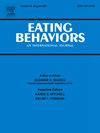Acculturative stress, body image ideals, body dissatisfaction, and eating pathology among Black, Asian, and Latina women
IF 2.4
3区 医学
Q2 PSYCHIATRY
引用次数: 0
Abstract
Background
Research supports the relation between acculturative stress and eating pathology across racially and ethnically diverse groups of women. However, relatively few studies have examined mechanisms of this link. The current study addressed these gaps by examining the potential roles of thin-, muscular-, and hourglass-ideal internalization and body dissatisfaction as mediators of the relation between acculturative stress and eating pathology among Asian, Black, and Latina women.
Methods
Adult women from across the United States (Asian N = 308; Black N = 389; Latina N = 234) completed measures of acculturative stress, body dissatisfaction, and eating pathology. Analyses investigated the direct and indirect roles of body image ideal internalization (thin-, muscular-, hourglass-) and body dissatisfaction as mediators of the relation between acculturative stress and eating pathology in each racial and ethnic group.
Results
Results identified a significant association between acculturative stress and eating pathology among all three groups of women (Asian, Black, and Latina). Also, across all groups, thin-, muscular-, and hourglass-ideal internalization mediated the relation between acculturative stress and eating pathology. Finally, body dissatisfaction mediated the relation between acculturative stress and eating pathology within the subsamples of Asian and Black women.
Conclusion
Interventions addressing eating disorder symptoms and body image could benefit from incorporating content related to acculturative stress and the impact of diverse body ideals, including thin, muscular, and hourglass, to enhance support for Black, Latina, and Asian women.
黑人、亚洲和拉丁裔女性的异文化压力、身体形象理想、身体不满和饮食病理
研究支持跨种族和多民族女性群体的文化适应压力和饮食病理之间的关系。然而,相对较少的研究检查了这种联系的机制。目前的研究通过检查亚洲、黑人和拉丁裔女性中瘦、肌肉和沙漏理想内化和身体不满作为异文化压力和饮食病理关系中介的潜在作用来解决这些差距。方法来自美国各地的成年女性(亚洲N = 308;黑色N = 389;Latina N = 234)完成了异文化压力、身体不满和饮食病理的测量。分析调查了身体形象理想内化(瘦型、肌肉型、沙漏型)和身体不满意作为跨文化压力和饮食病理之间关系的中介的直接和间接作用。结果发现,在所有三组女性(亚洲、黑人和拉丁裔)中,异文化压力和饮食病理之间存在显著关联。此外,在所有人群中,瘦型、肌肉型和沙漏型理想内化介导了异文化压力和饮食病理之间的关系。最后,在亚洲和黑人女性的亚样本中,身体不满介导了异文化压力和饮食病理之间的关系。结论针对饮食失调症状和身体形象的干预措施可以通过纳入与异文化压力相关的内容和不同身体理想的影响,包括瘦、肌肉和沙漏,以加强对黑人、拉丁裔和亚洲女性的支持。
本文章由计算机程序翻译,如有差异,请以英文原文为准。
求助全文
约1分钟内获得全文
求助全文
来源期刊

Eating behaviors
Multiple-
CiteScore
4.20
自引率
3.60%
发文量
65
审稿时长
60 days
期刊介绍:
Eating Behaviors is an international peer-reviewed scientific journal publishing human research on the etiology, prevention, and treatment of obesity, binge eating, and eating disorders in adults and children. Studies related to the promotion of healthy eating patterns to treat or prevent medical conditions (e.g., hypertension, diabetes mellitus, cancer) are also acceptable. Two types of manuscripts are encouraged: (1) Descriptive studies establishing functional relationships between eating behaviors and social, cognitive, environmental, attitudinal, emotional or biochemical factors; (2) Clinical outcome research evaluating the efficacy of prevention or treatment protocols.
 求助内容:
求助内容: 应助结果提醒方式:
应助结果提醒方式:


